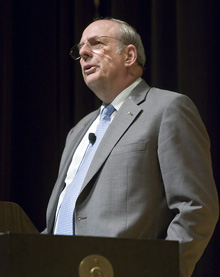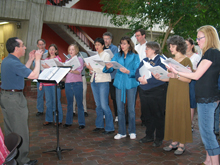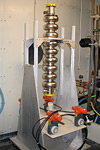 | Friday, June 2, 2006 |
|
Friday, June 2
Saturday, June 3
Monday, June 5 For links to events, click here. |
|
|
Secon Level 3 |
|
Friday, June 2 -Beef Pepper Pot -Buffalo Chicken Wings -Cajun Breaded Catfish -Sweet & Sour Pork over Rice -Honey Mustard Ham & Swiss Panini -Double Stuffed Pizza -Carved Turkey The Wilson Hall Cafe accepts Visa, Master Card, Discover and American Express. |
|
Wednesday, June 7 Lunch -Poached salmon w/watercress sauce -Spring Vegetable Medley -Chocolate Kahlua Flan
Thursday, June 8 |
| Fermilab Today is online at: http://www.fnal.gov/today/ Send comments and suggestions to today@fnal.gov Hurricane Relief Page Fermilab Today archive Fermilab Today PDF Version Fermilab Result of the Week archive Fermilab Safety Tip of the Week archive Linear Collider News archive Fermilab Today classifieds Subscribe/Unsubscribe to |
|
Harold Shapiro, the economist and former Princeton University president whose public service contributions range from policy advisory panels to the US Olympic Committee, says his dealings with particle physicists led to the first time he has been "induced" to use Power Point presentations. "I regard particle physicists as the aristocrats of Power Point," he told the Fermilab Annual Users Meeting on Thursday morning. "They intimidated me into using Power Point. So I made sure I spent a couple of weeks learning it before my presentation at SLAC a month or so ago."
Shapiro obviously learned well, delivering one powerful point after another in his explication and observations on the report of the National Academies' EPP2010 panel, which he chaired, and which he is presenting around the country. He says he didn't especially like the title: "Revealing the Hidden Nature of Space and Time: Charting the Course for Elementary Particle Physics." But when he raised the point with reviewers, he said he was told: "It's too late not to like the title. It's already been approved." Shapiro's candid, forthright presentation opened with the disclaimer (on a slide) that he was making "Informal Personal Observations (not approved by the National Academy of Sciences or the National Research Council)." His personal conclusions behind the report's official conclusions underscored the "current crisis in experimental particle physics." He declared, "It's hard to overestimate the critical nature of the next few years."
The challenge, Shapiro said, is to reverse the momentum of a program "that seems to be executing an exit strategy." He emphasized that especially at Fermilab, there were "very exciting experiments" being conducted. "But taking the longer view, as an outsider," he continued, "particle physics in this country does seem to be executing an exit strategy. To explain what I mean by an exit strategy: There is no compelling follow-on program established once the current program comes to an end."
|
|
From DOE Press Release, May 30, 2006: Statements from Secretary of Energy Samuel W. Bodman on the Senate's Confirmation of Dr. Raymond Orbach as the Under Secretary for Science
WASHINGTON, DC - I thank the Senate for their confirmation of Dr. Raymond Orbach as the department's first Under Secretary for Science. President Bush has placed a renewed emphasis on strengthening our nation's basic science research and education as part of the American Competitiveness Initiative. Ray will help oversee the expansion of basic science research at the department, including the doubling of the government's basic science budget over the next decade. With additional focus on basic science, our nation will continue to be the economic leader of the world. I congratulate Ray on today's confirmation and look forward to his continued service to the department and the nation.
|
|
|||
|
In a public lecture at Fermilab on Wednesday, Norman Augustine explained how the findings of the National Academies' October report, Rising Above the Gathering Storm: Energizing and Employing America for a Brighter Economic Future, boiled down to two unavoidable realities. "[First] Individual prosperity in our nation, or any nation, depends to a very large degree on people having jobs, good jobs." he said. "Second, we concluded that the existence of quality jobs in the decades ahead is very likely to depend on new developments in science and engineering."
The committee, composed of Nobel Laureates, university presidents, corporate CEOs and others, considered eight independent studies on societal returns on public investment in science and technology. According to Augustine, one of these studies attributed 50-85 percent of US GDP growth during the last half century to science and technology, and noted these fields could have an even greater impact in the years ahead. He cited another study that attributed the formation of 4,000 new companies, and a full 1.1 million new jobs to graduate student research done, within the Massachusetts Institute of Technology alone, in the past decade. "It's been only half jokingly said that today a third of the GDP is attributable to quantum mechanics," he said.
Augustine warned of the impact of what's been called the "death of distance" on America's ability to compete in these fields. As new communications technology allows increasingly complex jobs to be handled from abroad, Americans face job competition not only from within their community, but from around the world. Augustine gave examples of American CAT scans read in India, American taxes prepared in Costa Rica, and blueprints for American buildings drawn by architects in Malaysia, among others. "There is no longer a 'there' there," he said, referring to the fact that jobs no longer depend on the location of the worker. He quoted academy member and former Federal Reserve Vice Chairman Alan Blinder, stating that 50 million, or about one third of today's US jobs are susceptible to being moved over seas. "It's been said that a recession is when your neighbor is out of work, and a depression is when you are out of work," said Augustine. "To many Americans who thought their jobs were safe; this new competitiveness trend is starting to look a bit like a depression."
|
|
||
| The Fermi Singers will perform today at noon in the Ramsey Auditorium. Hear them sing international songs, and then stick around for complimentary refreshments. |
| First US Processed ILC Cavity Achieves Milestone |
|
Last week, after undergoing a buffered chemical polishing (BCP) treatment at Cornell University, the first US purchased, processed and tested International Linear Collider superconducting cavity achieved a milestone accelerating gradient of 26 MV/m (megavolts per meter). A joint effort of the SMTF (Superconducting Module Test Facility) collaboration, this accomplishment was a first test for the US facilities for ILC.
"This is a good achievement for the first step that we are going to take," said Hasan Padamsee of Cornell University. "ILC cavities have not been tested in the US yet, and none of our facilities have been checked out to that extent. We decided to do a standard treatment that has been done for some years now, and we got the best result that you can hope to get at this stage." |
|
May 31 - June 1 - Startup - TeV receives permission to run beam - Machine Reports Read the Current Accelerator Update Read the Early Bird Report View the Tevatron Luminosity Charts
|
|
Bicycle Commuter Challenge The Chicagoland Bicycle Federation's Bicycle Commuter Challenge is June 10-16. Riders are eligible for prizes and discounts at participating bike shops and other local businesses. See the webpage for details. Bicycle commuters can sign up and enter their miles on the Fermilab Bicycle to Work Website.
Summer Muscle Toning Class
English country dancing New classified ads have been posted on Fermilab Today.
|




